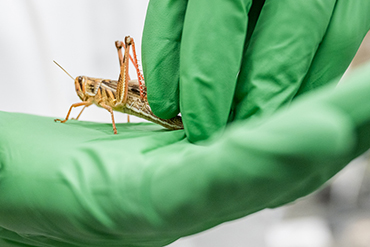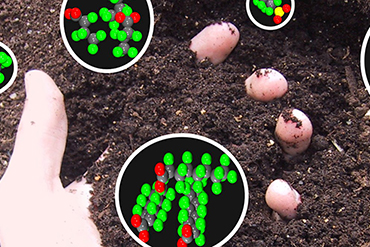
Jeff Searl receives cancer research education grant from the National Cancer Institute
ComArtSci Professor Jeff Searl has received a grant from the National Cancer Institute to create a virtual reality curriculum for healthcare professionals and students. It will initially focus on training students in nursing, medicine and speech-language pathology to both understand the differences between laryngectomy and tracheostomy patients and to provide care of their airway and communication needs.
Searl is collaborating with Andrew Dennis from the Games for Entertainment and Learning (GEL) Lab, Mary Kay Smith from The Learning and Assessment Center and College of Osteopathic Medicine, Peter LaPine from the Department of Communicative Sciences and Disorders, and Gayle Lourens from MSU’s College of Nursing, in order to create this innovative curriculum in the next two years.

Sniffing out cancer with locust brains
Michigan State research shows insects can differentiate between cancer cells and healthy cells, which could help detect the disease earlier.
Researchers at Michigan State University have shown that locusts can not only “smell” the difference between cancer cells and healthy cells, but they can also distinguish between different cancer cell lines.

A targeted and personalized approach to fighting cancer
Michigan State University is one of the top 100 research universities in the world and a member of the prestigious Association of American Universities, widely regarded as among the top research-intensive institutions in North America. The following story highlights one of the many examples of MSU’s research excellence and innovation.
Kurt Zinn is a professor of biomedical engineering in the Colleges of Engineering, Human Medicine and Veterinary Medicine and Investigator at the Institute of Quantitative Health Science and Engineering.

How Spartan simulations could help get PFAS out of soil
Michigan State computational chemists are revealing how persistent pollutants interact with soil minerals
Michigan State University chemists are discovering new information to help remediate “forever chemicals” by showing for the first time how they interact with soil at the molecular level.
